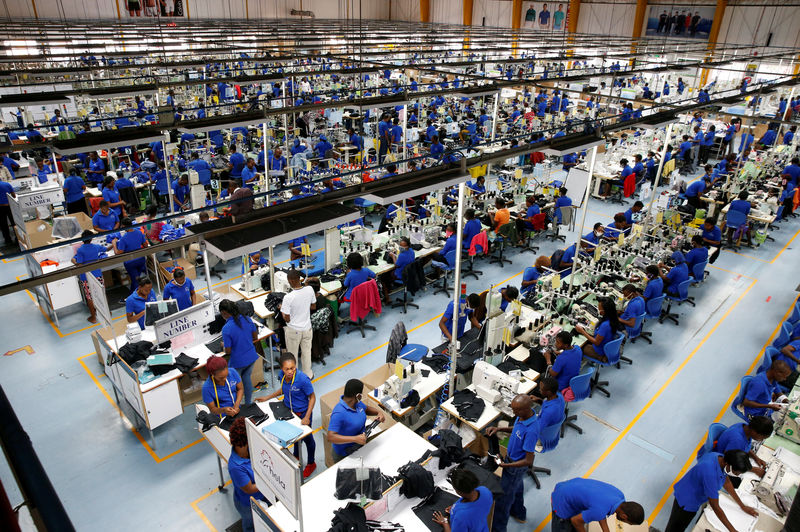By Duncan Miriri
NAIROBI (Reuters) - It's much easier to snag a seat in Nairobi's popular Strollers bar these days - a problem that manager Stephen Ngatia partly blames on Kenyan consumers hoarding their money during the turbulent election period.
Monthly sales have fallen by half since June, as cautious customers saved cash in case the Aug. 8 elections turned violent and they had to leave town fast. Many remember the violence that followed the disputed 2007 election, when 1,200 people died.
The August polls were relatively peaceful, but a ruling by the Supreme Court nullifying the presidential race and ordering a re-run means many consumers are still staying home and saving. The new election is scheduled for Oct. 17.
"Because of the repeat election, people don't want to spend their money. We are not expecting a recovery until maybe in December," Ngatia told Reuters.
Kenya's capitalist tradition, stability and role as a Western ally in a region roiled by conflict have made it a favored East African headquarters for international firms.
But the prolonged election period is slowing growth in the country, East Africa's richest per capita. The government projected the economy would expand by 5.9 percent this year, but first quarter growth was at 4.7 percent, mainly due to drought and a slowdown in private sector credit growth.
"The general election spreads across two quarters and it is not clear when political tensions will ease," said Irungu Nyakera, a principal secretary in the ministry of planning.
SLOW DOWN ACROSS SECTORS
The slowdown affected business sectors in different ways. Hospitality, retail and transport all suffered as consumers stayed home. But tourism and agriculture, two of the main foreign exchange earners, were largely unaffected.
The Nairobi bourse (NR:NSE) lost 130 billion shillings ($1.27 billion) over two sessions after the Supreme Court judgment. It has since recouped about half of that but the blue chip index, the NSE-20 (NSE20), is still 300 points below its year-high of 4114.01 points hit on Aug. 15.
The biggest firm by market capitalization, telecoms operator Safaricom (NR:SCOM), said it lost $3-4 million in revenue from its mobile financial services business, M-Pesa, during last month's vote.
East African Breweries (NR:EABL), controlled by Britain's Diageo (L:DGE), said business slowed over elections but declined to give details.
The retail sector was also hit, said Wambui Mbarire, the head of the Retail Trade Association of Kenya. Customers had stuck to buying basics like bread, milk and sugar, where the margins were thinnest, she said.
The transport sector lost money, despite a rush of voters traveling to their home villages, as other fearful citizens stayed home. Fuel consumption in August declined by 10-12 percent compared to July 2017 due to the slowdown, said the Kenya Private Sector Alliance (KEPSA), the main business lobby.
Demand for cement, estimated by industry executives at 500,000 tonnes a month, dropped by 15 percent in the weeks around the Aug. 8 vote, said Pradeep Paunrana, the chief executive of ARM Cement (NR:ARM), a leading producer.
"A lot of the construction sites were closed and the retail distribution chain, stockists were not keeping any more stock," Paunrana told Reuters.
In the port city of Mombasa, a regional gateway, cargo leaving the port dropped to 70 percent of normal levels during election week, said Bernard Osoro, corporate affairs manager at the port. It has since recovered to almost normal.
Many employers anticipate a similar slowdown when the elections are repeated, said Phyllis Wakiaga, chief executive of the Kenya Association of Manufacturers, representing 1,000 companies.
"We have seen people take a wait and see approach in terms of making serious investment," Wakiaga told Reuters.
The manufacturing sector contributes 10 percent of the annual economic output of $70.5 billion.
POLITICS HEATING UP
So far, veteran opposition leader Raila Odinga has rejected the Oct. 17 date for a re-run with President Uhuru Kenyatta. Odinga wants several senior election board staff members to resign, and to be given access to the election board's computer servers before polls are held.
On Tuesday, opposition lawmakers boycotted Kenyatta's opening of parliament, saying he is a lame duck president. Hate speech has also spiked: there were three times as many incidents in the week after the judgment than during the whole 10-week-long campaign, the government said.
Both sides claim to have won the vote, and are encouraging supporters to ensure they do again, setting the scene for a potential confrontation. Any prolonged clashes could be a disaster for Kenya's economy.
After the 2007 vote, the violence sent annual economic growth crashing to 1.7 percent in 2008 from 7.1 percent the previous year.
This week delegates from the Kenya Private Sector Alliance, the main business lobby, went to meet Kenyatta to express the group's concerns. The president sought to reassure them, saying: "Let business continue. No politician will be allowed to interfere with peace and stability."
But businessmen said the economy would not pick up until elections were over.

"With prolonged electioneering ... the country is expected to witness slowdown in business in various sectors that can lead economic decline," their statement said.
(editing by Katharine Houreld and Peter Graff)